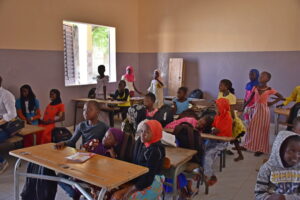In a recent study published in the journal Social Psychiatry and Psychiatric Epidemiology, an interdisciplinary team of researchers led by Ursula M. Read, Hanna Kienzler, Suzan Mitwalli, Yoke Rabaia, Lionel Sakyi, and Annabella Osei-Tutu delved into the intricacies of social inclusion for those living with psychosocial disabilities.
Focusing on the lived experiences in Ghana and the occupied Palestinian territory, the study sheds light on the challenges of integrating mental health narratives into different socio-cultural fabrics. Although differing in socio-political contexts, both nations have ratified the UN Convention on the Rights of Persons with Disabilities (CRPD), signalling a commitment to promoting the rights of those with disabilities, including psychosocial disabilities. The researchers write:
“Meaningful social inclusion for people with mental illness across the settings was perceived to require a holistic approach founded on empathy, tolerance, and acceptance to change public attitudes and understanding, alongside commitments from government, NGOs, and other agencies to provide consistent and equitable support and opportunities responsive to people’s changing needs.”
Delving deep into the dynamics of Ghana and the occupied Palestinian territory, the study captures a landscape wherein the implications of social inclusion are profoundly shaped by societal norms, political dynamics, gender roles, and other factors.
 Portrait of a village school in Ghana
Portrait of a village school in GhanaThe team embarked on this investigation in response to a pertinent question: How do different societies interpret and act upon the principle of social inclusion when it comes to serious mental health challenges? Notably, while social inclusion has taken centre stage in global mental health discussions, including in the 2022 WHO World Mental Health Report, there remains a lack of clarity around its real-world application.
Social inclusion in mental health emphasizes meaningful participation in community life. Key components include a sense of belonging, active community participation, autonomy, and available opportunities. However, several assumptions challenge this ideal. Communities, while often seen as protective and inclusive spaces, can also expose individuals with severe mental illness to discrimination and ridicule. Moreover, the pressure to conform to community norms can label those who differ as socially failing.
In addition, the concept of social inclusion isn’t universally consistent; it varies based on local customs, values, and hierarchies such as gender and age. Hence, while policies on social inclusion might seem universally beneficial, they might not consider the diverse experiences and challenges individuals face across different cultural and societal contexts.
The study, spanning five years (2017-2022), sought to understand the community experiences of individuals with mental health conditions in Ghana and the West Bank of the oPt.
In Ghana, with a population nearing 32 million, legacies of the slave trade and colonization have led to economic disparities, with a significant percentage of young men unemployed and two-thirds of the populace in unstable jobs. While Ghana has made advances in mental health policy and service, including the 2012 Mental Health Act and growth in community care, the emphasis remains on medication. There’s limited support outside pharmaceutical treatments, and people with psychosocial disabilities still face stigma, exclusion, and barriers to quality care.
Meanwhile, in the occupied Palestinian territory (oPt), the ongoing Israel-Palestine conflict has exposed its roughly 5 million residents to extreme violence and human rights abuses. This long-standing conflict has negatively impacted the mental health of Palestinians. Despite establishing 16 Community Mental Health Centres, oPt lacks a comprehensive mental health law, and community support is scarce, leaving those with psychosocial disabilities marginalized.
Using participatory action research and ethnographic methods, data was gathered through observations, discussions, and interviews involving people with psychosocial disabilities, their families, health providers, and community leaders. The field sites, selected for diverse urban/rural contexts, were in the West Bank’s governorates of Ramallah, Qalqilya, Bethlehem, and Jericho, and Ghana’s capital, Accra, and the Bono East region’s Kintampo.
Observations covered various settings like homes, workplaces, and places of worship, while semi-structured interviews focused on participants’ experiences, family dynamics, and societal relationships. The data, once gathered, was analyzed thematically, emphasizing core themes and cross-site comparisons.
Comparing Palestine and Ghana, critical cultural and societal similarities and differences were observed regarding social inclusion for people with serious mental illnesses. Despite shared community ideals of support and belonging, both settings exposed these individuals to prejudice and even violence.
Families often provided protection but could also be sites of conflict, constraint, and exclusion, particularly in contexts of poverty. Gender roles and societal norms, compounded by factors like political unrest in Palestine, shaped opportunities for social participation.
“Despite being highly valued, in practice, work was often experienced as stressful and discriminatory,” the researchers write. “Participants in both settings described being refused employment if they disclosed their mental health status, being dismissed from work when they experienced a relapse and distrust or hostility from co-workers or customers.”
Overall, social inclusion was only partially realized, with many desiring broader societal understanding and practical support opportunities rather than solely focusing on treatment. Participants in both regions stressed the importance of grassroots advocacy and collaboration across sectors, emphasizing the need for both policy development and action for genuine inclusion in areas like education, employment, and housing.
Despite the universal appeal for social inclusion, the study unveils the ambiguities of its practical application. As global discourse on mental health evolves, this study underscores the importance of adapting our strategies to respect, understand, and incorporate local cultural nuances and societal structures. Only through such intricate comprehension can we forge pathways to truly meaningful social inclusion.
****
Read, U. M., Kienzler, H., Mitwalli, S., Rabaia, Y., Sakyi, L., & Osei-Tutu, A. (2023). The ambiguities of social inclusion in mental health: learning from lived experience of serious mental illness in Ghana and the occupied Palestinian territory. Social Psychiatry and Psychiatric Epidemiology. Published online August 28, 2023. (Link)
Editor’s Note: Part of MITUK’s core mission is to present a scientific critique of the existing paradigm of care. Each week we will be republishing Mad in America’s latest blog on the evidence supporting the need for radical change.
